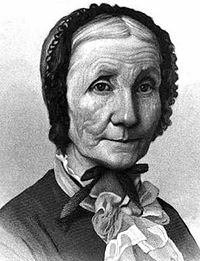Laura Haviland
| Laura Smith Haviland | |
|---|---|

Laura Smith Haviland (1881)
|
|
| Born |
December 20, 1808 Kitley Township, Ontario |
| Died | April 20, 1898 (aged 89) Grand Rapids, Michigan |
| Occupation | abolitionist, suffragette, temperance worker |
| Spouse(s) | Charles Haviland, Jr. |
| Children | Harvey Smith Haviland, Daniel Smith Haviland, Esther Mosher (Haviland) Camburn, Anna C. (Haviland) Camburn, Joseph Blancher Haviland, Jane (Haviland) Brownell, Almira Ann (Haviland) Laing and Lavina A. Haviland. |
| Parent(s) | Daniel Smith and Asenath “Sene” Blancher. |
Laura Smith Haviland (December 20, 1808- April 20, 1898) was an American abolitionist, suffragette, and social reformer. She was an important figure in the history of the Underground Railroad.
Laura Smith Haviland was born on December 20, 1808, in Kitley Township, Ontario, Canada to American parents, Daniel Smith and Asenath “Sene” Blancher, who had immigrated shortly before her birth. Haviland wrote that Daniel was ’’a man of ability and influence, of clear perceptions, and strong reasoning powers,’’ while her mother Sene was ’’of a gentler turn, …a quiet spirit, benevolent and kind to all, and much beloved by all who knew her.’’ The Smiths, farmers of modest means, were devout members of the Society of Friends, better known as Quakers. Haviland’s father was a minister in the Society and her mother was an Elder.
Though the Quakers dressed plainly, and strictly forbade dancing, singing, and other pursuits they deemed frivolous, many of their views were progressive by the standards of the day. The Quakers encouraged the equal education of men and women, an extraordinarily forward-thinking position in an age when most individuals were illiterate, and providing a woman with a thorough education was largely viewed as unnecessary. Quaker women as well as men acted as ministers. While most Quakers did not agitate vocally for abolition, the majority condemned slavery as brutal and unjust. It was in this atmosphere that Haviland was raised.
In 1815, her family left Canada and returned to the United States, settling in the remote and sparsely populated town of Cambria, in western New York. At the time there was no school near their home, and for the next six years Haviland’s education consisted of little more than "a spelling lesson" given to her daily by her mother. Haviland described herself as an inquisitive child, deeply interested in the workings of the world around her, who at a young age began questioning her parents about everything from scripture to Newton’s Law of Universal Gravitation. Once she had mastered spelling, Haviland supplemented her meager education by devouring every book she could borrow from friends, relatives, and neighbors, reading everything from religious material to serious historical studies.
...
Wikipedia
